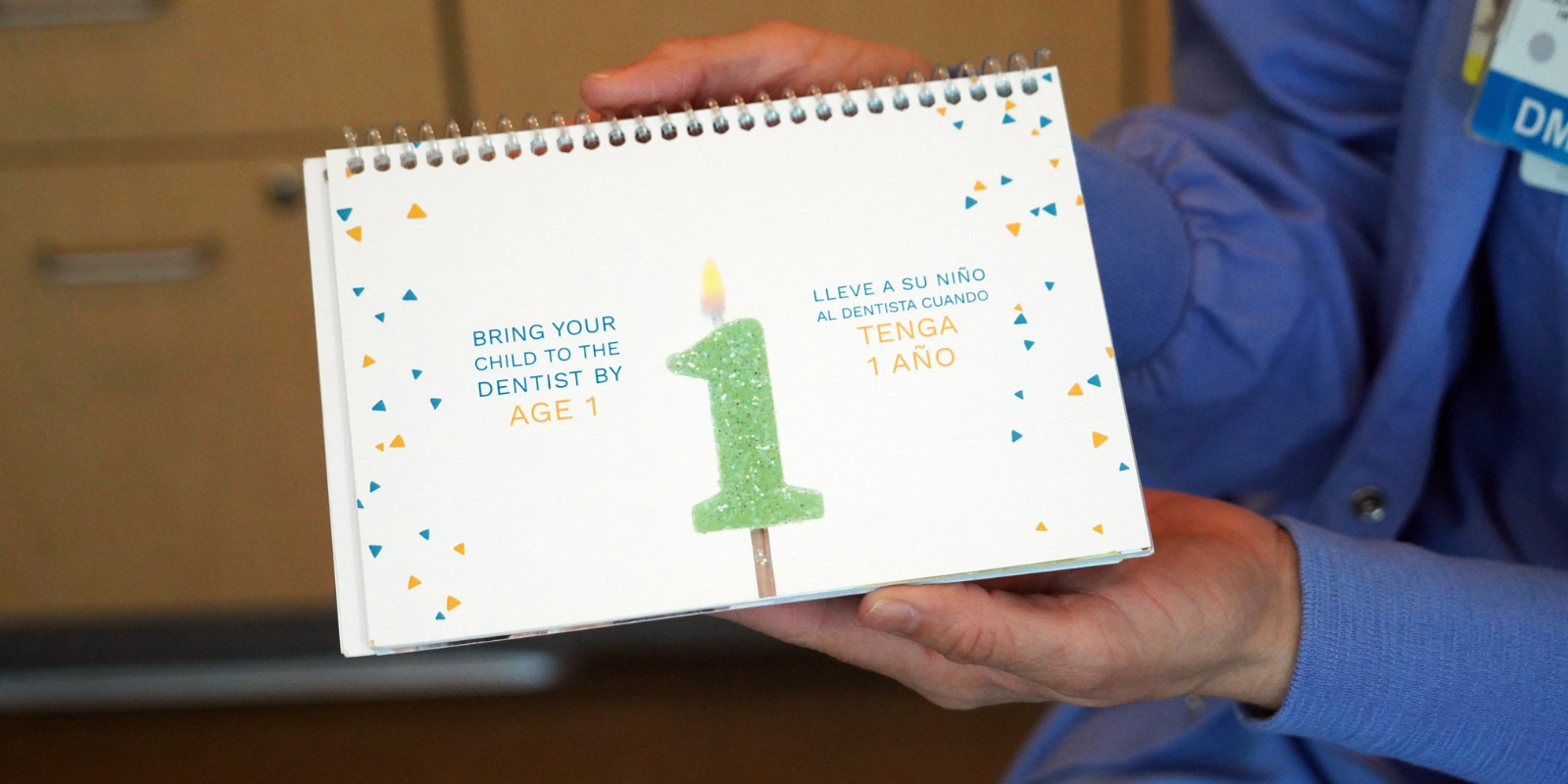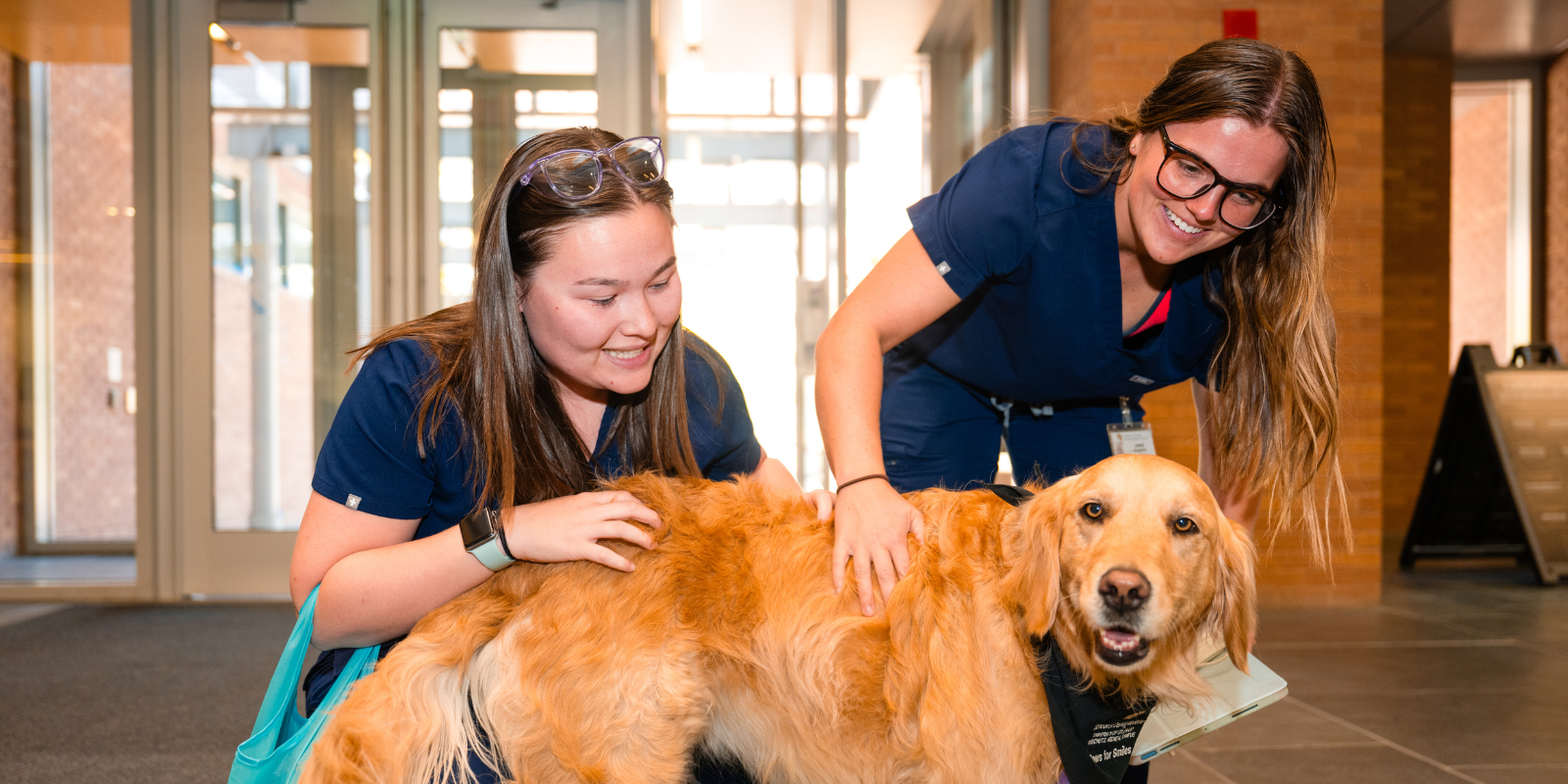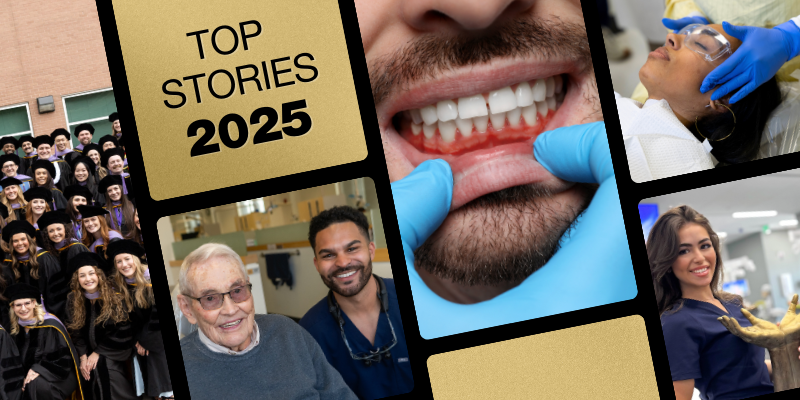When Maiti Grabow (DDS ’25) moved to Colorado for dental school, she hoped that composting would be more accessible here than in her home state, Arizona. Unfortunately, she was surprised to learn that the city of Aurora does not provide public compost, trash or recycling – residents must use private services.
“Sustainability has been an interest and a passion of mine for many years,” said Grabow. “Recently, I’ve been working on reducing the amount of waste I produce. This includes being a more conscientious consumer, driving less frequently, and throwing away less food.”
During her first semester at the University of Colorado School of Dental Medicine (CU SDM), studies took precedence over finding a way to compost, but it wasn’t long until a solution presented itself.
As part of the application process for the DDS program, Grabow interviewed with Douglas Wilson, DMD, MS; CU SDM clinical associate professor for restorative dentistry. He became Grabow’s faculty advisor and has taught some of her first-year classes.
“At the beginning of the school year, Dr. Wilson invited our advising group to have dinner at his farm to get to know each other and see what his life is like outside of the dental school,” she said. “Since then, he’s always been there for me. He offers advice for my projects, courses – anything.”

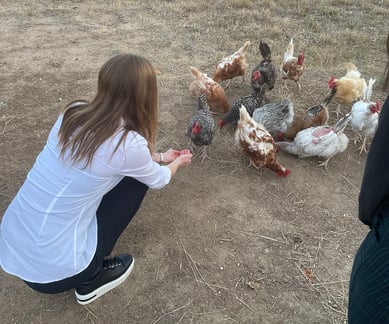
It was then that Grabow had an idea: What if Wilson could use her compost material on his farm? The answer was a resounding yes. This launched Grabow’s personal project to begin composting her organic waste and carrying a big orange bucket around campus to give to Wilson each week.
“There is a lot of waste going to local landfills that could be composted and put to good use,” said Wilson. “Maiti was talking about not being able to find a place to take her compost, so I volunteered to take it out of her hands. I feed everything she gives me to my chickens and then compost the chicken manure to use in the garden. That way it is used twice!”
Composting in Colorado
It may come as a surprise to learn that Colorado is one of the 20 most wasteful states in the US according to the 2021 State of Recycling & Composting in Colorado Report. “In 2020, Colorado’s statewide recycling and composting rate was just 15%, which is less than half the national recycling and composting rate of 32%.”
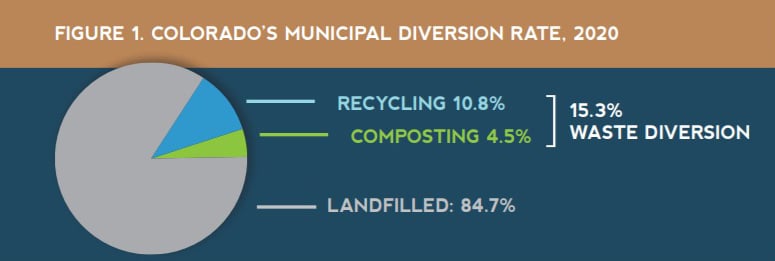
Grabow noted, “the city of Denver cites that 50 to 70 percent of the waste going to its landfills is compostable. This means that organic waste divergence is something most households can work on improving and could have a significant impact if done effectively.”
While compost programs exist in many Colorado municipalities, they often cost money to participate which can be discouraging or sometimes not an option at all. There are helpful resources online that explain how to compost at home, such as Denver Urban Gardens and Wompost, but anyone in an apartment building (without a yard or garden area to manage compost) – or a city that doesn’t allow it – may be out of luck.
At the University of Colorado, compost programs already exist on the Boulder and Colorado Springs campuses. Grabow’s project proposal will introduce composting to the CU Anschutz Medical Campus.
The President's Sustainable Solutions Challenge
Grabow began her composting arrangement with Wilson in January 2022 and learned about the President’s Sustainable Solutions Challenge (PSSC) in February, so she decided to register.
“I didn’t enter the competition with any expectations,” said Grabow. “Our campus has a huge opportunity to reduce the amount of waste we send to landfills, so I thought it was worth a shot, especially since I found a way to reduce my own waste and I knew other CU campuses had compost bins already.”
This annual challenge “encourages student-led innovation in sustainability on CU campuses” by inviting students with ideas for sustainability innovations or solutions to compete for a cash prize. Pitches are evaluated based on the following criteria:
- Problem/Solution
- Impact
- Feasibility
- Innovation
- Presentation
Grabow’s pitch was one of five from the CU Anschutz Medical Campus this year. The judging panel was comprised of professors and administrators from a variety of departments:
- Dr. Ethan Carter, research services director, department of environmental health and safety
- Dr. Jan Gascoigne, associate vice chancellor of student affairs and associate clinical professor, department of community & behavioral health
- Dr. Jill Slansky, professor of immunology & microbiology, CU Anschutz School of Medicine
Each school's competition committee decides how to break up the total monetary prize between winners. This year, first place received $1,500 and $500 went to second place. After hearing all the pitches and deliberating, the judges announced Grabow as CU Anschutz’s second-place winner.
Douglas Fritz, a student in the Medical Scientist Training Program at the CU School of Medicine, won first place with his pitch for a Green Revolving Fund.
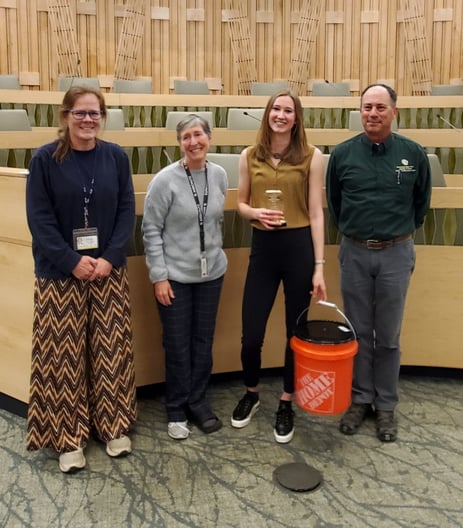
Left to right: Dr. Jill Slansky, Dr. Jan Gascoigne, Maiti Grabow, Dr. Ethan Carter |
The Future of Composting at CU Anschutz
Jarrett Smith, Sustainability Manager for the CU Anschutz Medical Campus, said, “we've known for a long time that students really want to see composting and better waste diversion efforts on campus, and Maiti’s project got that ball rolling again. It was a crucial reminder that we need to keep moving forward with those programs.”
Because of Grabow’s efforts, composting is likely to expand more rapidly across the CU Anschutz Medical Campus and could be fully realized by the time she graduates in 2025.
Grabow is happy with her success and looks forward to participating in the implementation of this initiative, but it’s not the last we’ll hear of her sustainability efforts. “By no means am I done with this project or with new ideas. Reducing organic food waste is only the beginning. I think that everyone on our campus could be more conscientious of how we use materials, even when we’re practicing in school.”
Wilson is pleased too. “Maiti is passionate about dentistry and helping the environment. I’m proud of her. With her dedication, passion and drive, Maiti will go far. Her potential is limitless. Composting will be one of the many marks she leaves on the campus.”
|
|
Fall 2022: Look for the big orange buckets in the Frisco parking lot on Fridays to drop off your compost for Dr. Wilson's farm!
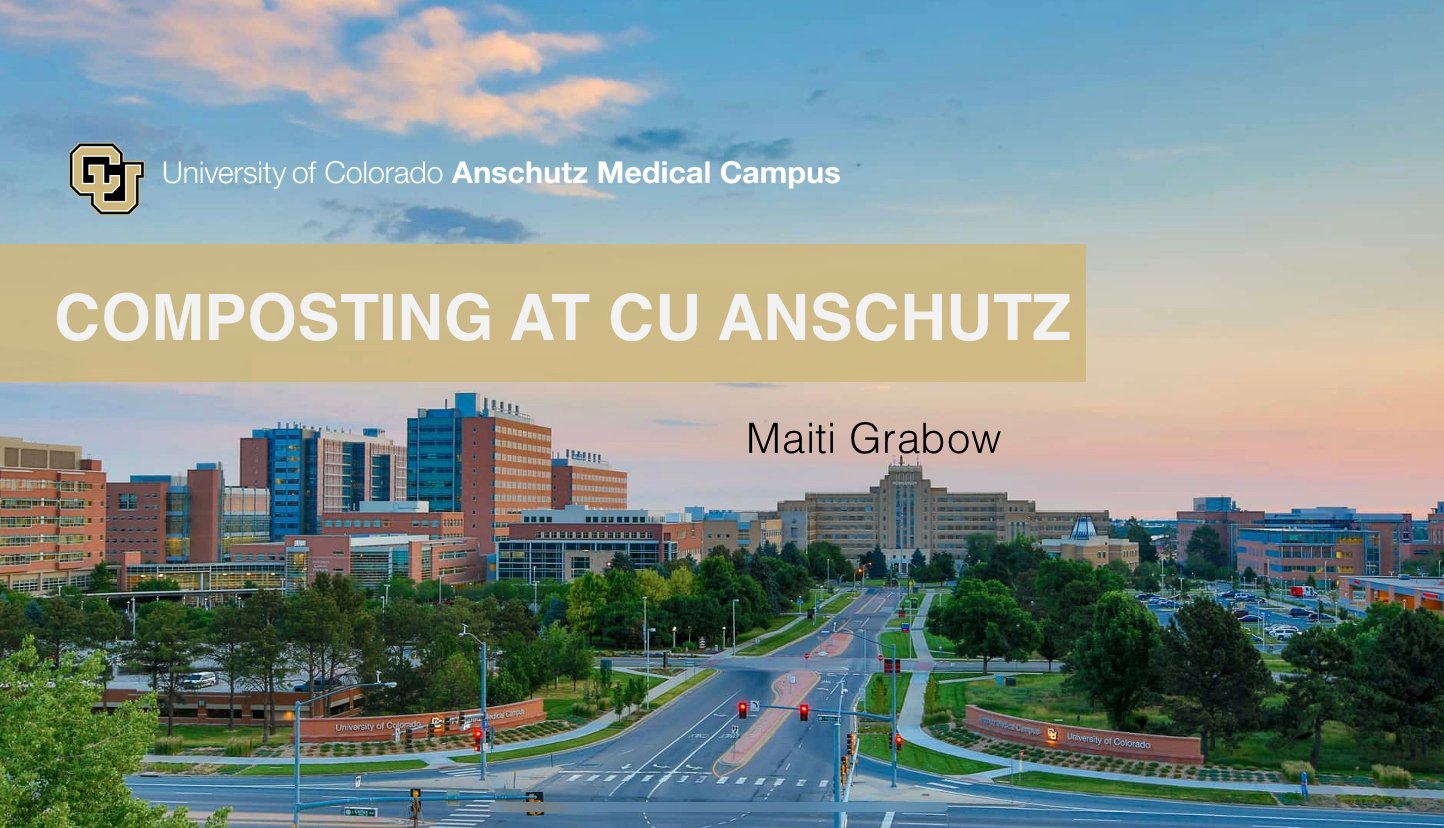
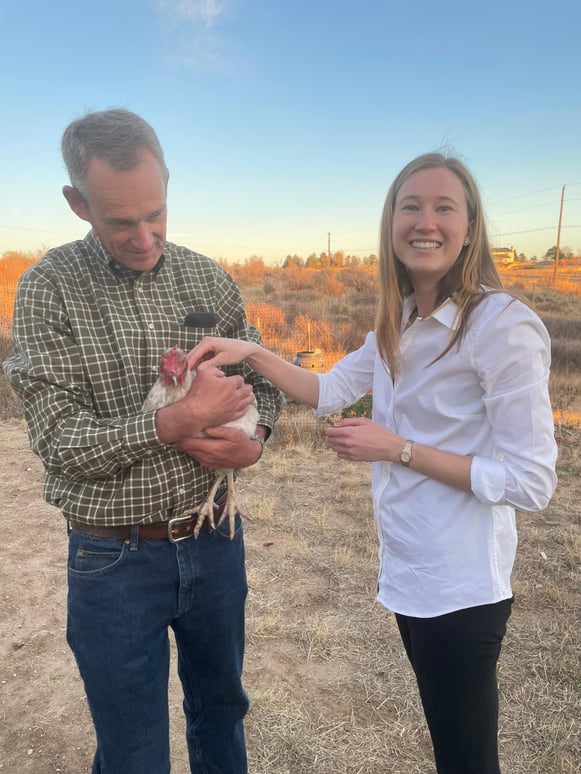 Dr. Douglas Wilson and Maiti Grabow (DDS '25) at Dr. Wilson's farm
Dr. Douglas Wilson and Maiti Grabow (DDS '25) at Dr. Wilson's farm